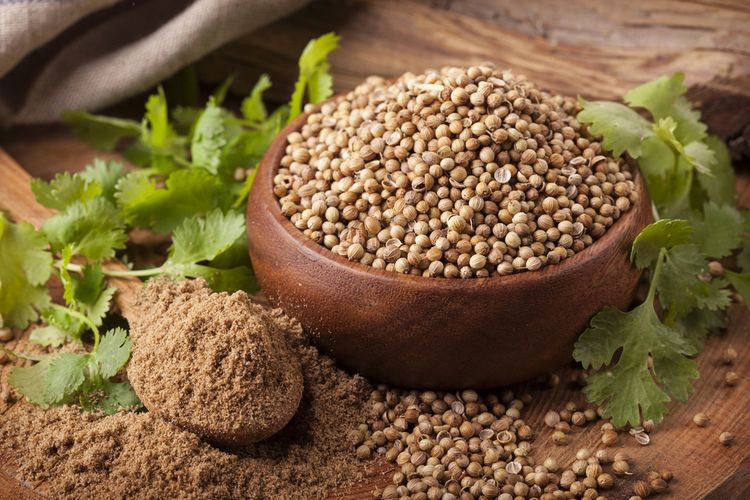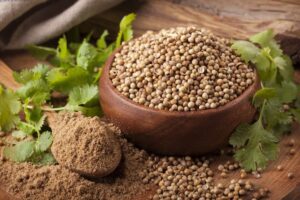

Welcome to the world of coriander seeds, a tiny ingredient packed with powerful benefits and potential side effects. Whether you sprinkle them on top of your favorite dishes or brew them into a soothing tea, these little seeds have been used for centuries for their medicinal properties. Join us as we explore the nutritional benefits, medicinal uses, and precautions associated with incorporating coriander seeds into your diet. Let’s dive in!
The Nutritional Benefits of Coriander Seeds
Coriander seeds are not just a flavorful addition to your dishes; they also pack a nutritional punch. These tiny seeds are rich in essential nutrients like iron, magnesium, and manganese. Iron is crucial for oxygen transport in the body, while magnesium plays a role in over 300 enzymatic reactions. Moreover, manganese contributes to antioxidant defense.
In addition to minerals, coriander seeds contain vitamins like vitamin A and vitamin C. Vitamin A supports vision and immune function, while vitamin C is important for collagen production and immune health. Furthermore, coriander seeds are a good source of dietary fiber which aids digestion and promotes gut health. Including coriander seeds in your diet can be an easy way to boost your nutrient intake without much effort. Whether you sprinkle them on salads or add them to curries, these versatile seeds can enhance both the flavor and nutrition of your meals.
Medicinal Uses of Coriander Seeds
Coriander seeds are not just a flavorful addition to your dishes; they also offer various medicinal benefits. These tiny seeds have been used for centuries in traditional medicine for their healing properties. One of the main medicinal uses of coriander seeds is their ability to aid digestion. They contain essential oils that can help promote healthy digestion and alleviate symptoms like bloating and gas.
In addition, coriander seeds are known for their anti-inflammatory properties, which may help reduce inflammation in the body and ease conditions like arthritis. Moreover, these seeds have antimicrobial properties that make them effective in fighting off harmful bacteria and infections. Furthermore, coriander seeds are rich in antioxidants, which can help protect the body from damage caused by free radicals and oxidative stress. Incorporating coriander seeds into your diet can provide you with a range of health benefits beyond just adding flavor to your meals.
How to Incorporate Coriander Seeds into Your Diet
Looking to add a burst of flavor and nutrition to your meals? Incorporating coriander seeds into your diet is a simple way to elevate your culinary creations. These tiny seeds pack a punch with their citrusy, earthy taste that can enhance both savory and sweet dishes. One easy way to use coriander seeds is by dry-roasting them in a pan until they release their aromatic oils. This step intensifies their flavor profile and adds depth to your recipes. You can then grind the roasted seeds into a powder or leave them whole for added texture.
Coriander seeds are versatile and can be sprinkled on top of salads, soups, stews, or curries for an extra kick. They also pair well with meats like chicken, lamb, or fish when used as part of a marinade or spice rub. For those with a sweet tooth, try incorporating ground coriander seeds into baked goods such as cookies, cakes, or bread for an unexpected twist. The possibilities are endless when it comes to experimenting with this flavorful spice in your kitchen!
Potential Side Effects of Consuming Coriander Seeds
While coriander seeds offer a plethora of health benefits, it’s essential to be aware of potential side effects that may arise from consuming them. Some individuals may experience allergic reactions to coriander seeds, resulting in symptoms like skin rashes or swelling. It’s crucial to monitor your body’s response when introducing new foods into your diet.
Coriander seeds contain compounds that could potentially interact with certain medications. If you’re taking medication regularly, consult with a healthcare professional before incorporating coriander seeds into your daily routine. Excessive consumption of coriander seeds may lead to digestive issues such as stomach upset or diarrhea. Moderation is key when adding these seeds to your meals.
For some people, the taste of coriander seeds might be too strong or unpleasant. Experiment with different ways of using them in cooking to find what works best for you and suits your palate. Remember, while the side effects are possible, they are not guaranteed for everyone who consumes coriander seeds. Listen to your body and make informed decisions about how this spice fits into your diet.
Precautions and Warnings when Using Coriander Seeds
When incorporating coriander seeds into your diet, it’s essential to be aware of potential precautions and warnings associated with their consumption. While coriander seeds offer numerous health benefits, there are some considerations to keep in mind. Individuals who are allergic to cilantro or other plants in the Apiaceae family may also have an allergy to coriander seeds. It’s crucial for those with known allergies to exercise caution when using these seeds in cooking or as a supplement.
Additionally, pregnant women should consult with their healthcare provider before consuming coriander seeds in large amounts. Although they are generally safe when used in normal food quantities, high doses of coriander seeds may have uterine stimulant effects. People taking medications that affect blood clotting should also use coriander seeds cautiously, as they contain coumarin compounds that could potentially interact with these drugs. Always seek advice from a healthcare professional if you have any concerns about incorporating coriander seeds into your daily routine.
Conclusion
Coriander seeds are a powerful spice that not only adds flavor to your dishes but also provides numerous health benefits. From being rich in antioxidants and vitamins to aiding in digestion and promoting heart health, these tiny seeds pack a nutritional punch.
When incorporating coriander seeds into your diet, remember to start with small amounts and pay attention to any potential side effects such as allergic reactions or skin sensitivity. It’s always best to consult with a healthcare professional before making significant changes to your diet or using coriander seeds for medicinal purposes.
By recognizing the benefits and side effects of coriander seeds, you can harness the goodness of this versatile spice while ensuring that it complements your overall well-being. So go ahead, sprinkle some coriander seeds into your next meal and experience the flavorful journey towards better health!




